A Time for New Dreams Read online
Also by Ben Okri
FICTION
Flowers and Shadows
The Landscapes Within
Incidents at the Shrine
Stars of the New Curfew
The Famished Road
Songs of Enchantment
Astonishing the Gods
Dangerous Love
Infinite Riches
In Arcadia
Starbook
The Comic Destiny (previously Tales of Freedom)
The Age of Magic
The Magic Lamp
The Freedom Artist
ESSAYS
Birds of Heaven
A Way of Being Free
The Mystery Feast
POETRY
An African Elegy
Mental Fight
Wild
Rise Like Lions (Anthology)
PLAYS
The Outsider
A TIME FOR NEW DREAMS
Ben Okri
www.headofzeus.com
First published in the UK in 2011 by Rider, an imprint of Ebury Publishing
This updated paperback edition published in the UK in 2019 by Head of Zeus Ltd
Copyright © Ben Okri 2011, 2019
The moral right of Ben Okri to be identified as the author of this work has been asserted in accordance with the Copyright, Designs and Patents Act of 1988.
All rights reserved. No part of this publication may be reproduced, stored in a retrieval system, or transmitted in any form or by any means, electronic, mechanical, photocopying, recording, or otherwise, without the prior permission of both the copyright owner and the above publisher of this book.
9 7 5 3 1 2 4 6 8
A catalogue record for this book is available from
the British Library.
ISBN (PBO): 9781788549639
ISBN (E): 9781788549622
Typeset by Adrian McLaughlin
Cover images: Shutterstock
Printed and bound in Great Britain by
CPI Group (UK) Ltd, Croydon CR0 4YY
Head of Zeus Ltd
First Floor East
5–8 Hardwick Street
London EC1R 4RG
WWW.HEADOFZEUS.COM
To Paul Marsh
Contents
Acknowledgements
Introduction
Poetry and Life
On Childhood (1)
Writers and Nations
Seeing and Being
Plato’s Dream
On Childhood (2)
The Romance of Difficult Times
Photography and Immortality
Hospitality
O, Ye who Invest in Futures
Dramatic Moments in The Encounter between Picasso and African Art
On Childhood (3)
10½ Inclinations
Self-Censorship
One Planet, One People
London, Our Future City
Musings on Beauty
On Childhood (4)
When Colours Return Home to Light
Form and Content
Healing the Africa Within
A Time For New Dreams
An Invitation from the Publisher
And out of the wilderness
The songbird sang:
‘Nothing is what it seems
When it’s a time for new dreams.’
ANON, 20TH CENTURY
Acknowledgements
Material in this collection has been previously published as follows:
‘On Childhood’ in Eye to Eye: Childhood (New Internationalist Publications, 1998); ‘Writers and Nations’ in Royal Society of Literature Magazine, 2003; ‘Plato’s Dream’ in The Times Higher Education Supplement, 2002; ‘Photography and Immortality’ in BP Portrait Award 2009 (National Portrait Gallery, 2009); ‘O, Ye who invest in Futures’ in The Caine Prize for Literature (New Internationalist Publications, 2000); excerpt from ‘Dramatic Moments in the Encounter between Picasso and African Art’ in Ode Magazine, 2007; ‘10½ Inclinations’ in Royal Society of Literature Magazine, 2006; ‘Self-Censorship’, the 2003 Scottish PEN Lecture at the Edinburgh International Book Festival, in the Herald (Glasgow), 2003; ‘Healing the Africa Within’ in Ode Magazine, 2004; and ‘A Time for New Dreams’ as ‘A Time for New Values’ in The Times, 2008.
Introduction
These essays are responses to aspects of the times. They are called poetic essays because their meaning is also to be found in their form. In some places a page is compressed into a line.
The aphorism is a tincture that dispenses with superfluous words. A thought ought to persuade by itself, by its truth and balance, the simplicity of its line, the clarity of its contour.
The cue is taken from drawing. A single line can lead the mind to terraces of contemplation. Naturally it depends on the line and the view.
Reading is an inner event. This is its abiding mystery. My art is often about getting out of the way. Sometimes though it is necessary to thunder, to waken with gongs and bells, to draw attention to what is coming, what is being done to us.
New dreaming is essential when times are difficult. It is through imagination that we transform time and compel new futures.
To dream here is synonymous with creating a new world in the mind, then shaping it with love and will. All true dreamers are heroes and heroines in the tough business of making possibilities real in the world.
Every book is a time capsule containing some essence of the period in which it was created. Writers speak to the future through the connecting membrane of time and the mind.
Every true book is a secret record of what the writer wrestled with in themselves and their times, what forces they summoned to help them through.
BEN OKRI
Little Venice, London, 2019
Poetry and Life
1
Heaven knows we need poetry now more than ever. We need the awkward truth of poetry. We need its indirect insistence on the magic of listening.
In a world of contending guns, the argument of bombs, and the madness of believing that only our side, our religion, our politics is right, a world fatally inclined towards war – we need the voice that speaks to the highest in us.
We need the voice that speaks to our joys, our childhoods, and to the Gordian knots of our private and national condition. A voice that speaks to our doubts, our fears, and to all the unsuspected dimensions that make us both human and beings touched by the whisperings of the stars.
2
Poetry is closer to us than politics, and is as intrinsic to us as walking or eating.
We are, at birth, born into a condition of poetry and breathing. Birth is a poetic condition: it is spirit becoming flesh. Death is also a poetic condition: it is flesh becoming spirit again. It is the miracle of a circle completed, the unheard melody of a life returning to unmeasured silence.
Between birth and death what are our daily moments but a double condition that is primarily poetic: the odd conjunction between inner and outer, between that inner sense of timelessness and that outer evidence of transience?
3
Statesmen talk about matters of state; poets help us to resonate with the fundamental rhythm of life, the iambics of walking, the elliptical strophes of every unique way of talking, the mysterious pulse of living.
Poetry begins in us an inner dialogue. It suggests a private journey to one’s own truth.
Let us bring together the voices of poetry from all over the world, and make our hearts a festival, a dreaming place, and our minds an academy of essentials under the stars.
4
Poetry is not just what poets write. Poetry is also the great river of soul-murmurings that runs within humanity. Poets merely bring this underground river to the su
rface for a moment, here and there, in cascades of sound and suggested meaning, through significant form.
5
The ancient oracles may be silent; and we may no longer believe in the many ways that the gods speak to us, or through us. But living means that we are the focus of many pressures: the demands of society, the strange pressures of being itself, of yearnings, inexplicable moods, dreams, and of feelings powerful with all the currents of mortal life.
6
We concentrate too much on our differences. Poetry returns us to the surprise of our similarities. It brings us back to the obscure sense that we are all members of a far-flung family, sharing feelings both unique to us and oddly universal.
We need more poetry than politics. But we need to constantly raise the possibilities of poetry. Poetry will not necessarily change the world. (Tyrants have been known to be poets, that is to say bad poets.) But so long as poetry sends our minds into realms of gold and questions, and touches our deep and tender humanity, then it will always be a force for beauty, for good, in the world, neutralising slowly the noise of guns and hatred.
7
The reason for the exalted condition of poetry is simple. Poetry is a descendant of the original word which mystics believe gave the impulse for all creation.
Poetry, at its highest, has alive in it, even in homeopathic doses, the creative power of the universe. Poetry incarnates that which shapes, changes, transforms. It makes something from what seems like nothing. How insubstantial words are! Who can weigh a word on a scale, even against a feather of truth? And yet see how much words weigh in the heart, in the imagination, in dreams, echoing down the ages, as durable as the Pyramids. Words, lighter than air, are as mysteriously enduring as lived time. Poetry hints at the godlike in us, and causes us to resonate with high places of being.
8
Poets want nothing from you, only that you listen to your deepest selves. Unlike politicians, they don’t want your votes.
True poets just want you to honour the original pact you made with the universe when you drew your first breath from the unseen magic in the air.
On Childhood (1)
1
Childhood is a mystery: the soul is timeless, the body new, and the world complex. What a conjunction: the great unfolding in the small. This is why childhood fascinates us. It is elusive. It is elusive in us.
Our childhood has disappeared in our ageing. Memories linger, perceptions remain, but the state itself is gone. Gone also is its world.
And childhood is a world, a separate realm. Its wondrous angles can’t be relived. Its confusions are dissolved into wrong certainties. Its terrors still lurk in us, but we can’t exactly locate them.
We are left with observing the childhood of others. We gaze into them as into a mirror. As if childhood were generic. When in fact childhood is specific to the child.
And so when we peer into childhood’s mirror we see only dim reflections. Vague memories of a lost world rise in us. But we are not invited back. The borders are closed. The realm in the mirror has vanished from the world. We are thus exiled in adulthood: either closed to, or perplexed by, mysteries.
2
Childhood evokes only nostalgia, when it should also evoke unease. For childhood is a philosophical problem always posed to living. The state of childhood asks questions that are seldom answered.
Childhood asks us what reality really is, what the world is, and where it came from. Childhood asks where life came from, and where it goes. Does the soul exist? Where was the soul before birth? How many realms are there? Are fairies real? Do ghosts and spirits exist? Why are some people lucky and others unlucky, why is there suffering? Why are we here? Are there more things in the innocent-seeming world than we can see? These are some of the questions that the state of childhood asks, and which perplex us all our days.
Childhood is an enigma, a labyrinth, an existential question, a conundrum. It is the home of all the great questions about life and death, reality and dream, meaning and purpose, freedom and society, the spiritual and the secular, nature and culture, education and self-discovery.
3
Childhood is the Nile of life, the Eden, the Atlantis: the living emblem of mysterious places, vanished origins, lost beginnings, all that haunts because never to be found again. It is the cradle of future flowering, the celebrated place of innocence, of first loves, first evils, first falls, first sufferings, of first floods, and of the first civilisations within each human spirit. It is the Nile whose source leads to the illimitable.
4
Out of childhood rises the sphinx that is the adult. The sphinx who cannot pose its own riddle, much less answer it.
And yet from this Nile, from childhood, what personality is already present! Where did that distinct self come from? In what place intangible had that mind been gestating? In what universities of the invisible had this personality been preparing?
Its perspectives on the world surprise. The best observations of children ought to have a place in the academies of the world. It is not just the innocence of childhood that should command our attention. It is also its unseeing, or rather its pure seeing, uncontaminated by structures of habit. That way children sometimes have of perceiving things asequentially, tangentially. As though through the corridors of their minds clear winds of intuitions flow, hinting at the essential unreality of time and space.
How like a mature unlearning childhood is. Small wonder the sages throughout time use the state of childhood to speak of the highest things, the highest peaks of our cultural and spiritual attainment.
Writers and Nations
1
There is no mystery about the decline of nations. It begins with the decline of its writers. Its first symptom is the nation’s failure to celebrate its writers. Why is this so? Because writers represent the unconscious vigour and fighting spirit of a land.
2
Writers are the very sign of the psychic health of a people. They are the barometer of the vitality of the spirit of a nation. They are the beacon on the promontory signalling that here dwells a people strong enough to face its truths, brave enough to confront its demons, confident enough to diagnose the necessary drastic healing required for its malaise. They symbolise a people creative enough to dream new possibilities that will expand the psychic and moral resources of the land, and free enough to launch into great new adventures of the spirit. In this way true writers herald discovery, productivity, fertility, and resistance to spiritual despair. They embody that sublime sense of fearlessness in the challenging enterprise of civilisation.
3
When a nation celebrates its true writers, it celebrates itself. When a nation does not celebrate its writers it does not have much to celebrate. It does not have much to trumpet about itself to the world. It has no feats of the mind and spirit that it wishes to hold up to itself and to the world as visible signs of its shining accomplishments. Such a nation declares itself barren, dull, and spiritually bankrupt. It declares that it has lost the capacity to achieve things that rouse the sleeping powers of its citizens and capture the wandering imagination of the world. A nation that does not honour its truest, bravest, most creative, most enduring writers is a nation that has fallen out of love with itself.
4
Contemplate the literary frescoes of the ages. The Greeks were never more possessed of vitality and genius than when they had among them the living spectacle of their great tragedians; or when they bore in the casket of their hearts the magic force of Homer’s words, as Alexander did while creating the new ages.
Look upon the era of Pericles, of Sophocles, Euripides, Thucydides, of Herodotus. Extend the vision to Virgilian Rome, when poets sang the ascending sunlight of the nation’s soul into immortality. Think even of the writers like cracked oracles who cried out of the oncoming doom in imperishable words – that too was vitality.
Behold the vigour of the Elizabethans, of Shakespeare and Marlowe, and the sprawling intensity of their literat
ure welling up like springs from rich underground streams. It was a golden age given space in its time. The wonder of the land that we all gaze back on in astonishment.
In Germany during the age of Goethe, the writers were the central force of the far-sighted spirit of the nation. The constellation of its poets, novelists, and playwrights created, in two generations, an extraordinary burst of luminous potential.
France too is a nation so alive to the practical and magical powers of the writer that its boulevards and roads celebrate their names as a public talisman. Thus it keeps active the very spirit of its great writers and their enduring works in the roads that its citizens walk along. This power, this value, is thus perpetually alchemising the consciousness of the people.
And so Rue Victor Hugo or Boulevard Voltaire are not just reminders of these great personalities who once wrote and shook the world; they make what is best in them present. The force that they have incarnated in the imagination is subtly impacted into the people’s psyche, as they walk or drive down these roads.
Such a nation is never far from the spirit of creativity. It lives always in creativity’s force field. Such a nation, even at its low points, always retains the power to charm. It also always contains the inclination to rise again to its former glory.
To celebrate, or to dwindle into dullness, seems to me the law at work here.

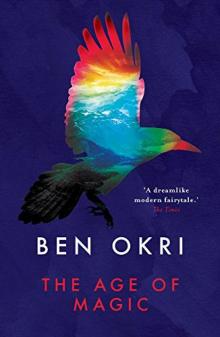 The Age of Magic
The Age of Magic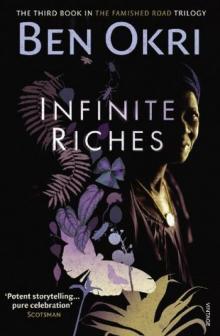 Infinite Riches
Infinite Riches Songs of Enchantment
Songs of Enchantment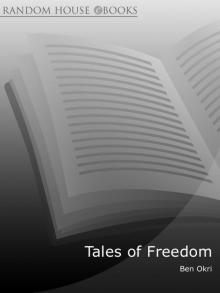 Tales of Freedom
Tales of Freedom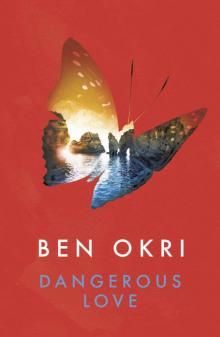 Dangerous Love
Dangerous Love Starbook
Starbook The Famished Road
The Famished Road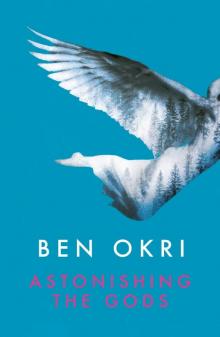 Astonishing the Gods
Astonishing the Gods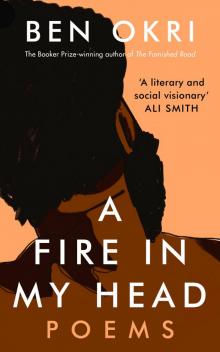 A Fire in My Head
A Fire in My Head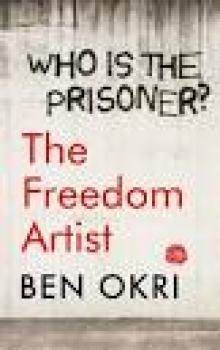 The Freedom Artist
The Freedom Artist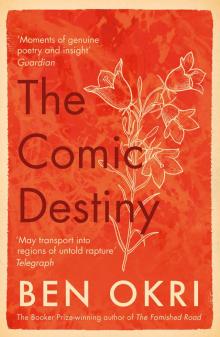 The Comic Destiny
The Comic Destiny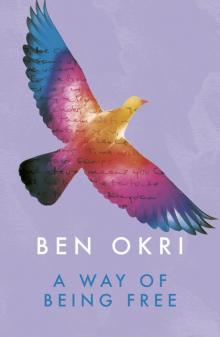 A Way of Being Free
A Way of Being Free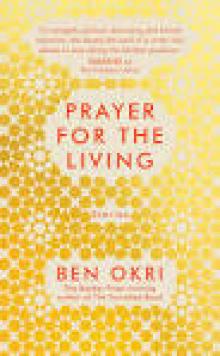 Prayer for the Living
Prayer for the Living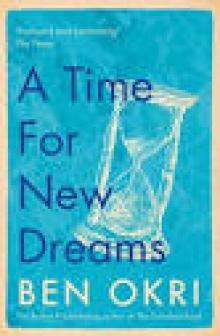 A Time for New Dreams
A Time for New Dreams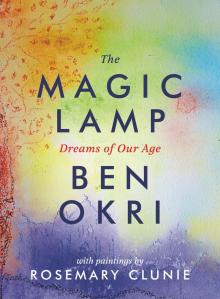 The Magic Lamp
The Magic Lamp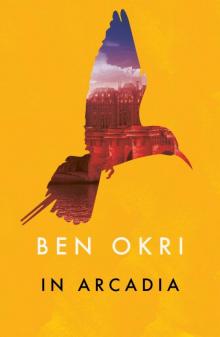 In Arcadia
In Arcadia